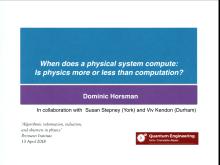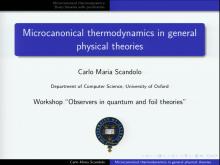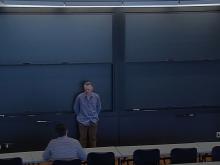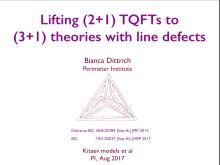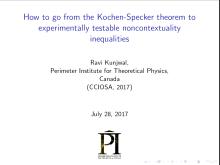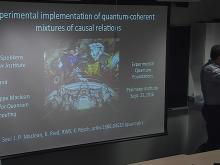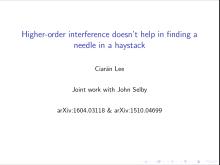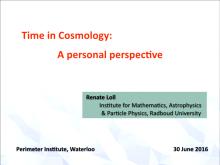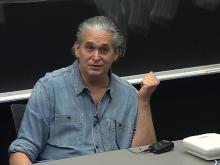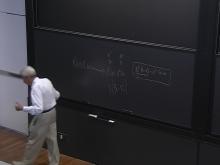Quantum foundations concerns the conceptual and mathematical underpinnings of quantum theory. In particular, we search for novel quantum effects, consider how to interpret the formalism, ask where the formalism comes from, and how we might modify it. Research at Perimeter Institute is particularly concerned with reconstructing quantum theory from more natural postulates and reformulating the theory in ways that elucidate its conceptual structure. Research in the foundations of quantum theory naturally interfaces with research in quantum information and quantum gravity.
Format results
-
17 talks-Collection NumberC18007
Talk
-

-

Quantum speedup in testing causal hypotheses
Giulio Chiribella University of Hong Kong (HKU)
-

The Logic of Physical Law
Stefan Wolf Università della Svizzera italiana
-

-

On the concepts of universality in physics and computer science
Gemma De Las Cuevas Universität Innsbruck
-

A no-go theorem for observer-independent facts
Časlav Brukner Institute for Quantum Optics and Quantum Information (IQOQI) - Vienna
-

-

Algorithmic information theory: a critical perspective
Tom Sterkenburg Ludwig-Maximilians-Universität München (LMU)
-
-
Observers in Quantum and Foil Theories
11 talks-Collection NumberC18006Talk
-

Wavefunction branches as a foundation for constructing foil theories
Jess Riedel NTT Research
PIRSA:18040082 -

Compatibility of implicit and explicit observers in quantum theory and beyond
Thomas Galley Institute for Quantum Optics and Quantum Information (IQOQI) - Vienna
PIRSA:18040084 -

From observers to physics via algorithmic information theory I
Markus Müller Institute for Quantum Optics and Quantum Information (IQOQI) - Vienna
PIRSA:18040078 -

From observers to physics via algorithmic information theory II
Markus Müller Institute for Quantum Optics and Quantum Information (IQOQI) - Vienna
PIRSA:18040080 -

Motility of the internal-external cut as a foundational principle
Robert Spekkens Perimeter Institute for Theoretical Physics
PIRSA:18040073 -

-

Quantum theory cannot consistently describe the use of itself
Renato Renner ETH Zurich
PIRSA:18040085 -

-
-
Lecture Series on Operational General Relativity
6 talks-Collection NumberC17054Talk
-

Operational General Relativity - Lecture 1
Lucien Hardy Perimeter Institute for Theoretical Physics
-

Operational General Relativity - Lecture 2
Lucien Hardy Perimeter Institute for Theoretical Physics
-

Operational General Relativity - Lecture 3
Lucien Hardy Perimeter Institute for Theoretical Physics
-

Operational General Relativity - Lecture 4
Lucien Hardy Perimeter Institute for Theoretical Physics
-

Operational General Relativity - Lecture 5
Lucien Hardy Perimeter Institute for Theoretical Physics
-

Operational General Relativity - Lecture 6
Lucien Hardy Perimeter Institute for Theoretical Physics
-
-
Talk
-

Semisimple Hopf algebras and fusion categories
Cesar Galindo Universidad de los Andes
-

The Hopf C*-algebraic quantum double models - symmetries beyond group theory
Andreas Bauer Freie Universität Berlin
-

Modular categories and the Witt group
Michael Mueger Radboud Universiteit Nijmegen
-

Topological Quantum Computation
Eric Rowell Texas A&M University
-

Gapped phases of matter vs. Topological field theories
Davide Gaiotto Perimeter Institute for Theoretical Physics
-

An Introduction to Hopf Algebra Gauge Theory
Derek Wise University of Erlangen-Nuremberg
-

Kitaev lattice models as a Hopf algebra gauge theory
Catherine Meusburger University of Erlangen-Nuremberg
-

Topological defects and higher-categorical structures
Jurgen Fuchs Karlstad University
-
-
Contextuality: Conceptual Issues, Operational Signatures, and Applications
23 talks-Collection NumberC17027Talk
-

Welcome and Opening Remarks
Robert Spekkens Perimeter Institute for Theoretical Physics
-

Quantum Mechanics in a New Key
Simon Kochen Princeton University
-

What do we learn about quantum theory from Kochen-Specker quantum contextuality?
Adan Cabello Universidad de Sevilla
-

Noncontextuality: how we should define it, why it is natural, and what to do about its failure
Robert Spekkens Perimeter Institute for Theoretical Physics
-

Towards a mathematical theory of contextuality
Samson Abramsky University of Oxford
-

Kochen-Specker contextuality: a hypergraph approach with operational equivalences
Ana Belen Sainz Gdańsk University of Technology
-

The contextual fraction as a measure of contextuality
Shane Mansfield University of Edinburgh
-

Nonlocality and contextuality as fine-tuning
Eric Cavalcanti Griffith University
-
-
Experimental Quantum Foundations
5 talks-Collection NumberC16034Talk
-

Direct experimental reconstruction of the Bloch sphere
-
Michael Mazurek Institute for Quantum Computing (IQC)
-
Matthew Pusey University of York
-
-

Single-photon test of Hyper-Complex Quantum Theories
Lorenzo Procopio University of Vienna
-

-

-

Experimental implementation of quantum-coherent mixtures of causal relations
Robert Spekkens Perimeter Institute for Theoretical Physics
-
-
Formulating and Finding Higher-Order Interference
9 talks-Collection NumberC16018Talk
-

-

-

-

Does relativistic causality constrain interference phenomena?
Markus Müller Institute for Quantum Optics and Quantum Information (IQOQI) - Vienna
-

-

-

-

-
-
Time in Cosmology
14 talks-Collection NumberC16016Talk
-

Welcome and Opening Remarks
-
Marina Cortes Institute for Astrophysics and Space Sciences
-
Lee Smolin Perimeter Institute for Theoretical Physics
-
Neil Turok University of Edinburgh
-
-

-

The origin of arrows of time II
-
Sean Carroll California Institute of Technology (Caltech) - Division of Physics Mathematics & Astronomy
-
Marina Cortes Institute for Astrophysics and Space Sciences
-
Tim Koslowski Technical University of Applied Sciences Würzburg-Schweinfurt
-
-

The origin of arrows of time II cont.
-
Sean Carroll California Institute of Technology (Caltech) - Division of Physics Mathematics & Astronomy
-
Marina Cortes Institute for Astrophysics and Space Sciences
-
Tim Koslowski Technical University of Applied Sciences Würzburg-Schweinfurt
-
-

Testing time asymmetry in the early universe
-
Brian Keating University of California, San Diego
-
Andrew Liddle University of Lisbon
-
Richard Muller University of California, Berkeley
-
-

The fate of the big bang
-
Abhay Ashtekar Pennsylvania State University
-
Neil Turok University of Edinburgh
-
-

Time as Organization – Downward Caustation, Structure and Complexity I
Barbara Drossel Technische Universität Darmstadt
-

Time as Organization – Downward Caustation, Structure and Complexity II
-
Stuart Kauffman Santa Fe Institute
-
George Ellis University of Cape Town
-
-
-
Concepts and Paradoxes in a Quantum Universe
44 talks-Collection NumberC16015Talk
-

-

Finally making sense of Quantum Mechanics, part 1
Yakir Aharonov Chapman University
-

How to count one photon and get a(n average) result of 1000...
Aephraim Steinberg University of Toronto
-

-

The Quantum Tip of the Two-Vector Iceberg
Avshalom Elitzur Chapman University
-

The arrow of time for continuous quantum measurements
Andrew Jordan University of Rochester
-

Observation of Aharonov-Bohm effect with quantum tunneling
Yutaka Shikano Institute for Molecular Science, National Institutes of Natural Sciences
-

-
-
Concepts and Paradoxes
11 talks-Collection NumberC16008Talk
-

-

-

-

-

-

Sudden Sharp Forces and Nonlocal Interactions
Yakir Aharonov Chapman University
-

Protective Measurement and Ergodicity
Yakir Aharonov Chapman University
-

-
-

-

Lecture - Causal Inference, PHYS 777
Robert Spekkens Perimeter Institute for Theoretical Physics
-
Algorithmic Information, Induction and Observers in Physics
17 talks-Collection NumberC18007Our universe is of astonishing simplicity: almost all physical observations can in principle be described by a few theories that have short mathematical descriptions. But there is a field of computer science which quantifies simplicity namely algorithmic information theory (AIT). In this workshop we will discuss emerging connections between AIT and physics some of which have recently shown up in fields like quantum information theory and thermodynamics. In particular AIT and physics share one goal: namely to predict future observations given previous data. In fact there exists a gold standard of prediction in AIT called Solomonoff induction which is also applied in artificial intelligence. This motivates us to look at a broader question: what is the role of induction in physics? For example can quantum states be understood as Bayesian states of belief? Can physics be understood as a computation in some sense? What is the role of the observer i.e. the agent that is supposed to perform the predictions? These and related topics will be discussed by a diverse group of researchers from different disciplines.
-
Observers in Quantum and Foil Theories
11 talks-Collection NumberC18006Foil theories sometimes called mathematically rigorous science fiction describe ways the world could have been were it not quantum mechanical. Our understanding of quantum theory has been deepened by contrasting it with these alternatives. So far observers in foil theories have only been modeled implicitly for example via the recorded probabilities of observing events. Even when multi-agent settings are considered these agents tend to be compatible in the classical sense that they could always compare their observations. Scenarios where agents and their memories are themselves modeled as physical systems within the theory (and could in particular measure each other as in Wigner's friend experiment) have not yet been considered. In this workshop we will investigate which foil theories allow for the existence of explicit observers and whether they allow for paradoxes in multi-agent settings such as those found in quantum theory. We will also investigate which interpretations of quantum theory would equally well interpret the foil theories and which interpretations are truly quantum. We will gain a deeper understanding of how this can happen by discussing appropriate definitions observers in these theories and seeing how such observers learn about their environment.
-
Lecture Series on Operational General Relativity
6 talks-Collection NumberC17054Lecture Series on Operational General Relativity -
Hopf Algebras in Kitaev's Quantum Double Models: Mathematical Connections from Gauge Theory to Topological Quantum Computing and Categorical Quantum Mechanics
18 talks-Collection NumberC17029The Kitaev quantum double models are a family of topologically ordered spin models originally proposed to exploit the novel condensed matter phenomenology of topological phases for fault-tolerant quantum computation. Their physics is inherited from topological quantum field theories, while their underlying mathematical structure is based on a class of Hopf algebras. This structure is also seen across diverse fields of physics, and so allows connections to be made between the Kitaev models and topics as varied as quantum gauge theory and modified strong complementarity. This workshop will explore this shared mathematical structure and in so doing develop the connections between the fields of mathematical physics, quantum gravity, quantum information, condensed matter and quantum foundations.
-
Contextuality: Conceptual Issues, Operational Signatures, and Applications
23 talks-Collection NumberC170272017 marks 50 years since the seminal 1967 article of Kochen and Specker proving that quantum theory fails to admit of a noncontextual model. Despite the fact that the Kochen-Specker theorem is one of the seminal results concerning the foundations of quantum theory, there has never been a large conference dedicated to the subject. The 50-year anniversary of the theorem seems an opportune time to remedy this oversight. Furthermore, in the last decade, there have been tremendous advances in the field. New life has been breathed into the subject as old conceptual issues have been re-examined from a new information-theoretic perspective. Importantly, there has been great progress in making the notion of noncontextuality robust to noise and therefore experimentally testable. Finally, there is mounting evidence that the resource that powers many quantum advantages for information processing is contextuality. In particular, it has been shown to underlie the possibility of universal quantum computation. Many groups worldwide are actively engaged in advancing our knowledge on each of these fronts and in deepening our understanding of the distinction between quantum and classical theories through the lens of contextuality. Through this conference, we aim to bring together leading researchers in the field in order to develop a broader perspective on the issues, draw connections between different approaches, foster a more cohesive community, and set objectives for future research.
-
-
Formulating and Finding Higher-Order Interference
9 talks-Collection NumberC16018Formulating and Finding Higher-Order Interference
-
-
Concepts and Paradoxes in a Quantum Universe
44 talks-Collection NumberC16015Concepts and Paradoxes in a Quantum Universe
-
-

Self testing in General Probabilistic Theories
Lionel DmelloThis talk will consist of two parts. In the former I discuss published work [LD, Ligthart, Gross, PRA, 2024], and in the latter some new related results. Part 1 -- Although there exist theories with "stronger bipartite entanglement" than quantum mechanics (QM), in sense that they have a larger CHSH value than Tsirelson's bound for QM, all such theories known tend to come at a cost, namely, they have strictly weaker bipartite measurements. Thus it has been conjectured that if one looks at scenarios where the correlations depend both on bipartite states and bipartite measurements, e.g. entanglement swapping, such theories cannot beat QM. However, in our recent work [LD, Ligthart, Gross, PRA, 2024], we constructed a General Probabilistic Theory (GPT) -- Oblate Stabilizer Theory (OST) -- that can both achieve a CHSH value of 4 (the mathematical maximum), and maintain this CHSH value after arbitrarily many rounds of entanglement swapping, effectively ruling out this conjecture. Part 2 -- One particularly non-intuitive feature of OST (for those in the know) is the presence of a "spurious extra dimension" in the local theory: Even though the CHSH violation involves only a two-dimensional section of local state space, we failed to make the entanglement swapping property work without going to three dimensions. In ongoing work, we managed to identify the mechanism behind this phenomenon. To this end, we have introduced a notion of self-testing for GPTs, and, using this we have established a GPT version of the "no-pancake" theorem that says that there is no completely positive map that maps the Bloch sphere to a two-dimensional section. Further, under reasonable assumptions, we have also managed to establish the uniqueness of OST, and provide a prescription for the construction of GPTs capable of stable iterated entanglement swapping. -

Lecture - Causal Inference, PHYS 777
Robert Spekkens Perimeter Institute for Theoretical Physics
